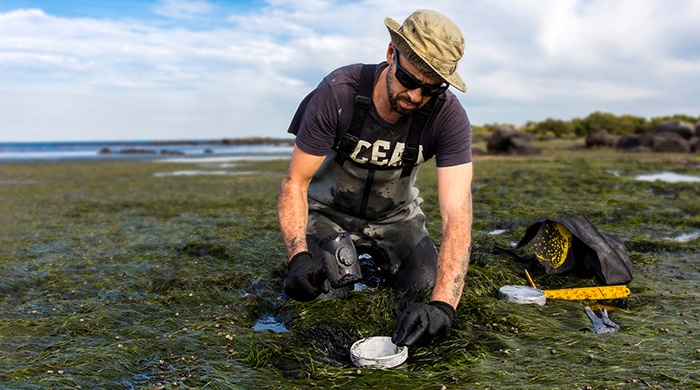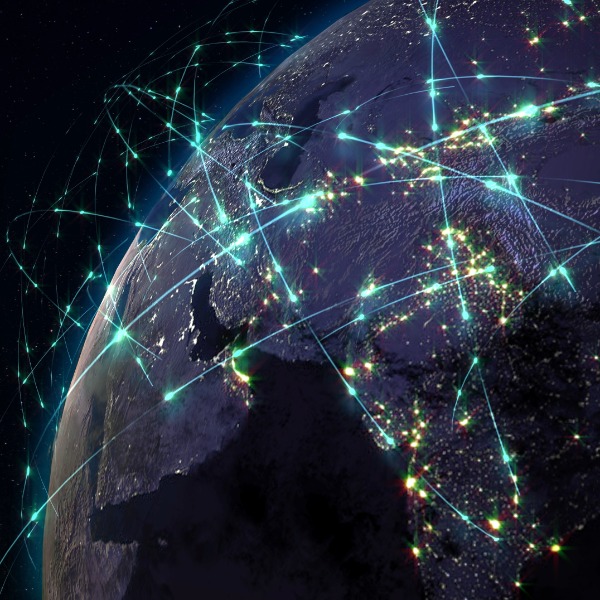Online Bachelor of Science in Environmental Science (BS)
Learn how to help protect natural resources and combat climate change. This bachelor’s degree program from American Public University (APU) provides an in-depth overview of the branches of science that help inform sustainable practices.

About APU's Online Environmental Science Degree Program
This Bachelor of Science in Environmental Science program combines coursework in both natural and social sciences. It focuses on the complex relationship between scientific research and public policy.
Students in this online environmental science program also develop a conceptual understanding of environmental policy and analysis. Courses cover environmental management issues, including:
- Sustainability
- The stewardship of natural resources
- Pollution science
- Fish and wildlife conservation
- Waste management
- Geographic information systems (GIS)
In addition to gaining underpinnings in scientific methods, students can hone their critical thinking, data analysis, communication, and presentation skills. Environmental sciences courses are taught by expert practitioners. Many faculty members are leaders in the field and have held positions at the National Park Service, USDA Forest Service, Environmental Protection Agency, National Oceanic and Atmospheric Administration, the Nature Conservancy, and other prominent federal agencies and nongovernment organizations.
Environmental Science Concentrations
Our bachelor's degree program in environmental science allows students to focus their studies by offering three concentrations. For example, with a fish and wildlife management concentration, you'll learn about the government agencies involved with resource management as you study conservation-related regulations and techniques. Select a concentration to learn more.
About the Concentration
A general concentration allows you to take courses across a number of areas of study within your program based on your own interests.
Program Objectives
About the Concentration
The undergraduate Climate Change and Resilience Concentration offers students an interdisciplinary approach to understanding, addressing climate change, as well as adapting to its risks and impacts on both ecological and human systems. This includes the environmental, economic, and social factors that affect how natural and human systems respond to ongoing changes in climate. Students who choose this concentration gain foundational knowledge that will help them inform the management of resources, support adaptation and mitigation strategies, and foster resilience in vulnerable systems.
Program Objectives
Upon successful completion of this concentration, the student will be able to:
- Describe the fundamental concepts and principles of climate science, adaptation, and resilience.
- Compare risk and vulnerability of natural and human systems to climate-related outcomes.
- Assess adaptation strategies across different sectors, with a focus on optimizing resources and supporting long-term benefits.
- Explain policies, regulations, and laws that influence how societies are addressing climate change, including considerations for mitigation and the protection of systems such as water supply.
- Develop interdisciplinary approaches that integrate ecological, social, cultural, and economic perspectives to advance climate change and resilience concentration goals through effective planning and use of finance and other key supports.
About the Concentration
Offers an overview of concepts and principles of fish and wildlife resource management. Examines the agencies responsible for resource management and the competencies of professional fish and wildlife managers. Management techniques and methods, public lands management, and the regulations, policies, and politics that influence U.S. fish and wildlife management are also covered.
NOTE: Students wishing to enroll in SCIN311, SCIN314, SCIN401, or SCIN402 for their concentration work MUST also take BIOL134 as a prerequisite. BIOL134 is NOT included in the BS Environmental Science major and is needed for these more specialized courses offered through the Natural Sciences program. This requirement cannot be waived. Please note that students can complete the Concentration in Fish and Wildlife Management without taking these specialized courses, but if these courses are desired the additional BIOL134 prerequisite must be completed as part of the student’s elective hours.
Program Objectives
Upon successful completion of this concentration, the student will be able to:
- Describe the fundamental concepts and principles of the management of fish and wildlife resources.
- Explain the impact of human activities on the survival and management of fish and wildlife populations.
- Identify the federal, state, and local agencies responsible for the management of fish and wildlife resources.
- List the competencies needed to become a professional fish or wildlife manager.
- Compare the effectiveness of fish and wildlife management techniques and methods.
- Explain the regulations, policies, and politics that influence the management of fish and wildlife in the U.S.
Pursue a Career-Relevant Education Through APU’s Online Environmental Science Degree Program
Learning Outcomes for Students in This Environmental Science Program
This online bachelor’s degree program examines environmental management as both a scientific and a social issue. Core courses teach students how to exercise critical-thinking skills to help prepare them to tackle some of today’s leading environmental issues.
You will:
- Explore how the health of the air, water, and soil impacts ecosystem health and human health
- Utilize tools, including geographic information systems, to understand and evaluate environmental issues
- Learn the factors that impact development of and compliance with environmental regulations
- Discover how historic, social, and economic factors impact the environment
- Understand how economic development and sustainable practices go hand in hand
- Learn about the impact of ecological disasters on human life, productivity, and social and economic welfare
- Determine how to overcome barriers to sustainability and responsible development
Explore Career Paths in Environmental Science
Students who earn their bachelor's degrees in environmental science prepare to tackle some of today’s most pressing challenges. From combating climate change to conserving natural resources, graduates have the knowledge and skills to help protect the world around us.
Degree-holders may therefore consider pursuing career opportunities as:
- Environmental scientists, who test air, soil, and water to identify and mitigate pollution
- Wetland ecologists, who study aquatic life and work on restoration projects
- Wildlife biologists or game wardens, who protect and manage wildlife and their natural habitats
- Environmental consultants, who help organizations and governments follow environmental standards
Gain Practical, Real-World Skills in Environmental and Ecosystem Science
Online students at APU develop career-relevant skills as they explore the relationship between ecosystem science and environmental law. Assignments emphasize critical thinking and problem solving as students learn how to:
- Communicate the principles of environmental science to diverse audiences
- Assess the social, cultural, and political influences that impact environmental systems
- Navigate the ethical challenges surrounding sustainability efforts and environmental policymaking
Environmental science majors also learn how to use geographic information systems to create visual representations of data that represent ecological conditions.
“ Personally, having the fortitude to dive into and finish the environmental science program opened my universe to all that is possible in the world. I understood the importance of our precious soil all the way up to the wondrous atmosphere. ”
BS, Environmental Science
Browse Courses in This Online Environmental Science Degree Program
Why Pursue Your Environmental Science Degree at APU?
Our academic advisors work with you to help you choose a degree plan that meets your goals, find the right balance of classes, and more. We also offer a wealth of career services as well as mental health resources. In addition, you can get involved beyond the classroom by joining clubs like APU’s chapter of the National Association of Environmental Professionals; exploring campus leadership opportunities; or participating in volunteer work through the University.
APU is here to support your student journey
We know your well-being is vital to your success. That's why we offer a range of supportive resources to help you throughout your academic journey.
- Career Coaching
- 24/7 Mental Health Support
- Admissions & Advising Support
- Student Life
Career Coaching
Get individualized guidance to help you explore career options, strengthen professional skills, and prepare for the next step in your journey. Whether you’re just entering the workforce, changing fields, or advancing your professional knowledge, our career services team is here to help you translate your goals into action.
Learn More24/7 Mental Health Support
Your well-being is essential to your success. That’s why APU offers access to confidential, flexible, and around-the-clock mental health support. Through our partnerships with telehealth apps, you can connect with peers and professionals anytime you need to manage stress, maintain balance, or find motivation.
Learn MoreAdmissions & Advising Support
From your first course to the day you graduate, our admissions and advising teams are here to guide you every step of the way. You’ll receive personalized assistance with enrollment, program selection, and degree planning from professionals who understand the needs of adult learners.
Learn MoreStudent Life
At APU, learning extends far beyond the classroom. Enrich your college experience and expand your network by getting involved in any of our student organizations. From cultural and social organizations to program-specific honor societies, you’ll find a group to help you thrive during and after your studies.
Learn MoreAPU Provides an Affordable, Well-Rounded Education
As a pioneer in digital learning, APU makes education accessible and affordable through our online programs. Low tuition rates and generous transfer credit opportunities help reduce out-of-pocket expenses for students pursuing this bachelor’s degree in environmental science.
Online courses examine everything from soil science to natural resource management, while allowing students to avoid costs for room and board and/or commuting to campus.
- $0 Application Fee
- $0 Textbooks & Ebooks
- $0 Transfer Credit Evaluation
APU Removes Barriers
Quality Education Shouldn’t Break the Bank
We offer special rates and grants for eligible students and limit fees to help keep the cost of higher education within reach. Find out how you can save on tuition expenses with our:
- Transfer Credits
- Financial Aid
- Private Loans & Scholarships
- Military & Veteran Benefits
Transfer Credits
APU makes it easy to earn credit for the work you’ve already done. We accept transfer credits from prior college coursework, professional training, exams, and certifications. We’ll evaluate your transcripts at no cost and help you maximize eligible credits so you can save time, reduce costs, and stay focused on reaching your education goals sooner.
Learn MoreFinancial Aid
We’re committed to making quality education accessible and affordable. APU participates in federal financial aid programs, including grants and loans for those who qualify. Our Financial Aid Office can provide personalized guidance to help you understand your options, complete required forms, and make an informed decision about paying for your education.
Learn MorePrivate Loans & Scholarships
In addition to federal financial aid, some APU students choose to explore private education loans or external scholarships to help fund their studies. We encourage all students to first complete the Free Application for Federal Student Aid (FAFSA) to determine eligibility for federal student aid before considering private options. Be sure to research lenders carefully, compare terms, and understand your rights and responsibilities as a borrower.
Learn MoreMilitary & Veterans Benefits
Learn More
Applying to This Environmental Science Program
Designed for working adults, our online program offers great flexibility. Rolling admissions make it easy to enroll when it works best for you. Aside from submitting weekly assignments, you can complete your classes at any time you like.
Ready to get started? Submit your application online today.
- No Entrance Exams No SAT or ACT required for undergraduate programs
- No Application Fee For undergraduate & master’s-level courses
- Courses Start Monthly Enroll now, start next month
- All APU undergraduate programs require a minimum of a high school diploma or equivalent (i.e., GED). Please read all undergraduate admission requirements before applying to this program and be prepared to submit the required documentation.
- There is no fee to complete the APU admission application for this program. View steps to apply.
Learn More About the Bachelor of Science in Environmental Science
Earning your environmental science degree online has many advantages. For example, online courses provide a manageable way to balance your studies with work and other obligations.
Online learning also gives you the chance to connect with environmental science students throughout the country whom you might not have otherwise met. You can even complete hands-on activities through online courses that integrate labs.
Request More Information
Interested in a specific program or wondering about the application process? Fill out the quick form below, and we’ll follow up with details tailored to your goals. Click here if you are a current student and need assistance.
Consumer Information
Maryland Residents learn more about costs, completion rates, median debt, and more.
The University reserves the right to accept or deny credits according to policies outlined on our University website. Please see the University's transfer credit policy webpage for complete information.
The Preferred Military Rate is $250 per credit hour for undergraduate and master's-level courses. This rate is available to all U.S. active-duty servicemembers, National Guard members, Reservists, and military families, including parents, spouses, legal partners, siblings, and dependents.
See all military student benefits.




